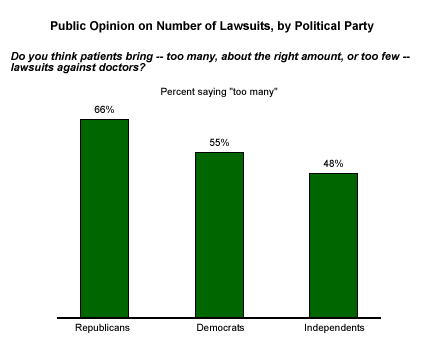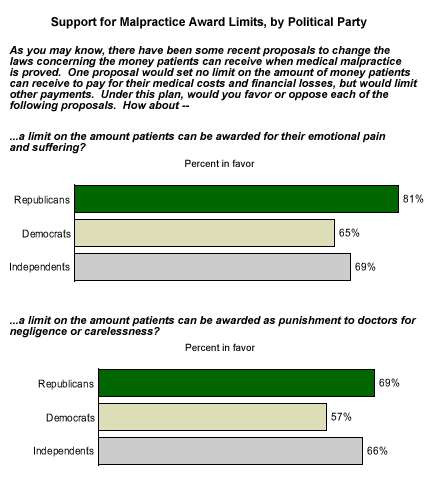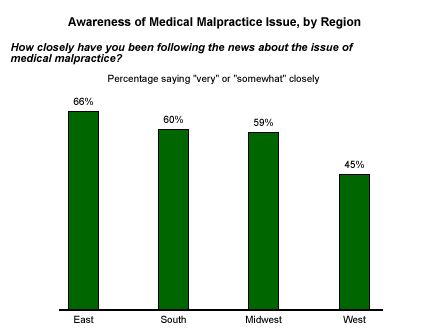Second in a two-part series on medical malpractice insurance.
Overall, there is strong public support for malpractice insurance reform, according to a January 2003 Gallup Poll*. However, there are some consistent differences in Americans' takes on this critical issue, especially along political lines.
Party Identification
As discussed previously (see "Americans Support Malpractice Award Limits" in Related Items), about three-fourths (74%) of the American public feels that medical malpractice insurance in healthcare is either a "crisis" or a "major problem."
General concern about the issue is shared equally by those who identify themselves with the two major political parties. Republicans and Democrats are also about equally likely to say they are following the issue of medical malpractice -- 61% of Republicans are following it very or somewhat closely, compared to 63% of Democrats -- and are equally likely to describe it as a "crisis" or "major problem" for the country (75% of both Republicans and Democrats describe it in this manner). Just 48% of independents report following it very or somewhat closely, but independents are as likely as partisans to say the issue is a crisis or a major problem (73%).
Differences by political affiliation appear in Americans' opinions of what has caused the problem, and how to address it. Two-thirds (66%) of Republicans feel patients are bringing too many lawsuits against doctors. Though that percentage is significantly lower among Democrats (55%), it remains a majority. Forty-eight percent of independents feel that patients bring too many lawsuits against doctors.

With regard to remedying the malpractice insurance problem, 69% of Republicans and 66% of independents favor a limit on the amount that patients can be awarded as punishment to doctors for negligence or carelessness, compared to 57% of Democrats who say the same. Eighty-one percent of Republicans favor a limit on the amount patients can be awarded for emotional pain and suffering; only 65% of Democrats and 69% of independents say the same.

Regional Variation
Media attention to doctor walkouts in certain parts of the country (i.e., West Virginia, Florida, Mississippi, and New Jersey), poses the question of possible regional variation in public opinion on medical malpractice. The fact that doctor strikes have just occurred in states east of the Mississippi River may explain why just 45% of Westerners say they are following the issue very or somewhat closely. That compares to 66% of Easterners, and roughly 6 in 10 living in the South and Midwest.

About three-quarters of Americans in each of the four geographical regions (73% in the West, 73% in the South, 74% in the Midwest, and 78% in the East) see medical malpractice as a crisis or a major problem. Further, there is relatively little regional variation in regional levels of support for limits on patient awards for emotional pain and suffering or punishment to doctors for negligence or carelessness.
Bottom Line
Concern for the issue of medical malpractice cuts across regional and, to a lesser extent, political boundaries. However, there is considerable variation among members of different political parties when it comes to opinions on the causes of medical malpractice problems and their remedies. The highly political nature of the issue even among the public is likely to pose significant hurdles to the passing of medical malpractice legislation in state legislatures across the country.
*Results are based on telephone interviews with 1,006 national adults, aged 18 and older, conducted Jan. 20-22, 2003. For results based on the total sample of national adults, one can say with 95% confidence that the maximum margin of sampling error is ±3%.